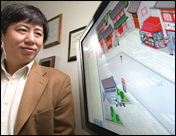Chinese Language and Culture Education
- Yong Zhao
- Department of Counseling, Educational Psychology, and Special Education
- College of Education

Yong Zhao with his online video game.
It's not so much that Yong Zhao wants to educate American students specifically in Chinese culture, though that's certainly a core component of his work. Rather, Dr. Zhao's work is about changing the way we look at educational systems.
Across cultures, there are a lot of misperceptions about different educational systems. Societies tend to glorify their own system and criticize others, or vice versa. In reality, every system has its strengths and weaknesses; each system was designed to support its own context.
A product of both the Chinese and the U.S. educational systems, Zhao examines what is good and bad about each of them. Rather than promoting one system over another, he said, "The truth always lies in between. The educator's job is to bring as much truth as possible."
Zhao has actively pursued partnerships in China that are reshaping educational research and policy in both places. The U.S. – China Center for Research on Educational Excellence and the Confucius Institute at MSU both grew out of these efforts.
At the moment, there are five partner schools in Michigan and one in China, and Zhao expects several more to come on board within the next year. These partner schools are required not only to incorporate curricular changes, but also to make physical changes. Students in participant schools spend half of each day in a traditional Western-style classroom and half in an Eastern-style classroom, where desks are arranged differently and walls are decorated with Chinese signs and language posters. This facilitates an environment more conducive to role-playing in language learning.
Zhao used the example of a child speaking English with her parents at home and French at the house of her native French-speaking grandparents. By embedding language and cultural lessons directly into a separate classroom, he said, teachers reinforce the notion that "in different places you should act differently"—an important concept as globalization increases.
The Confucius Institute has a strong Internet presence. Zhao pointed out that few American teachers are certified in Chinese. The small number and the correlating geographical constraints mean that only a limited number of schools can be reached, whereas Web sites are accessible to anyone with Internet access. Beyond the Confucius Institute Web site, Zhao's team is also exploring Second Life, an interactive virtual world. Second Life has explicitly been designed for role-playing, and Zhao and his team are interested in the impacts this may have on online language learning.
Through his partnerships, Zhao has begun thinking much more broadly about his own research. Currently, he is exploring what globalization means for education. "Globalization," he said, "enlarges the market for all kinds of talents." Schools no longer have to limit learning; every child can pursue his or her own interests. Dr. Zhao hopes his research will help students discover, cultivate, and personalize their own talents and learning rather than continue under the "dictatorship of learning."
- Written by Lisa Eldrid, University Outreach and Engagement